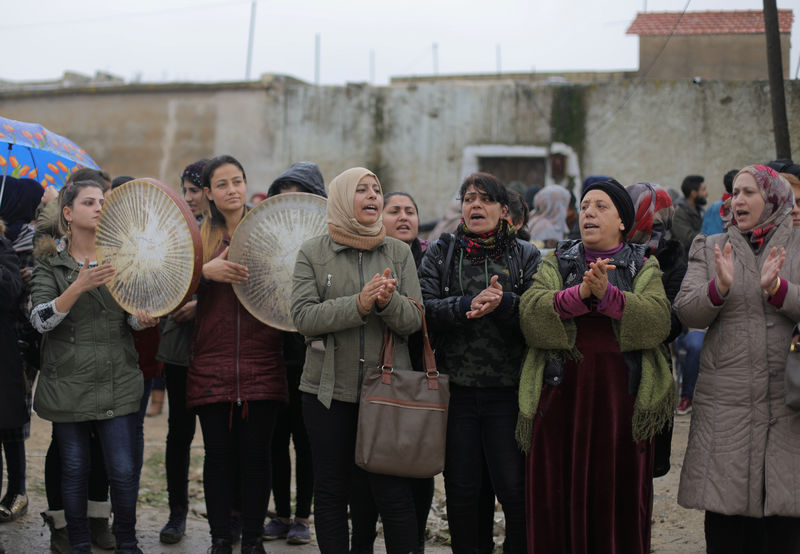By Tom Perry and Ellen Francis
BEIRUT (Reuters) - Kurds, among the biggest winners of Syria's war, stand to lose most from a U.S. decision to withdraw forces who have helped them battle Islamic State militants and deter their adversaries Ankara and Damascus.
With U.S. help, the Kurdish-led Syrian Democratic Forces have captured large parts of northern and eastern Syria from Islamic State, but warn that the jihadists still pose a threat even if President Donald Trump has declared their defeat.
NATO allies France and Germany agree, saying Washington's abrupt reversal of course on Syria - fulfilling a Trump presidential campaign pledge in 2016 - risks sapping the fight against Islamic State (IS).
Not only will Trump's decision expose SDF territory to the risk of an IS resurgence, but it increases the possibility of an assault on Kurdish-dominated northern Syria by Turkey and its Syrian rebel proxies.
It's shaping up to be a case of deja vu for the Kurds, a stateless minority divided between Syria, Iraq, Iran and Turkey whose national aspirations have historically been thwarted by foreign powers. The Kurds are the largest ethnic group left stateless when the Ottoman Empire collapsed a century ago.
To protect themselves from Turkey, some analysts say, Syrian Kurdish groups may now beat a path to Damascus to make a deal with President Bashar al-Assad and his Russian allies who could shield them in exchange for the surrender of their autonomy.
Unlike Syria's rebels, the SDF and the Kurdish YPG militia that leads it have never fought to topple Assad. At times, they have even cooperated against common insurgent foes and earlier this year political talks were held in Damascus.
These however got nowhere: Assad opposes the Kurdish vision of a federal Syria that preserves their regional autonomy.
Seen as the most likely winners from a U.S. withdrawal, Assad and his Iranian and Russian allies are already eyeing the recovery of SDF territory that spans roughly one quarter of Syria and is rich in farmland, oil and water.
"The Syrian government must certainly take the area after the (U.S.) withdrawal," an official in the Iranian-backed regional alliance that supports Assad told Reuters.
In the Kurdish regions of northern Syria, Trump's move has deepened fears of an attack by Turkey, which views Kurdish control of the north as a menace to its security and has demanded an end to U.S. support for the SDF.
"Before, America was here and nobody was afraid. But now the (Turkish) threats scare us," said Bengin Seydo, 35, speaking in the town of Ras al-Ayn where a demonstration was held on Thursday against any Turkish attack.
Trump's decision stunned the SDF, even though it had been wary of what it saw as shaky U.S. policy toward Syria, said Ahmad Sleiman, a Kurdish politician and commentator.
"Relying on the Americans is always a failed experience, at the very least for Kurds," he told Reuters. "Now the Kurds' choices have become much tougher."
"SERIOUS DANGER" FROM ISLAMIC STATE
U.S. support for the Syrian Kurdish YPG militia, the backbone of the SDF, evolved from 2014 when Islamic State was at its zenith and the Kurds were battling to prevent IS capturing the town of Kobani at the Turkish border.
The relationship enraged neighboring Turkey, which views the YPG as an extension of the Kurdistan Workers' Party (PKK), which has waged a 34-year-old insurgency in Turkey's mainly Kurdish southeast.
Ties expanded as YPG fighters rolled back Islamic State with air and special forces support from the U.S.-led coalition. Islamic State has now lost most of its territory in Syria.
But at least 5,000 jihadists are still battling hard in their last enclave east of the Euphrates River near the Iraqi border, SDF commander-in-chief Mazloum Kobani told Reuters last week.
These include hardened foreign combatants and possibly even the group's leader, Abu Bakr al-Baghdadi, Kobani said. Islamic State also has a pocket of desert territory west of the Euphrates in areas otherwise held by Damascus and its allies.
Nawaf Khalil, a German-based analyst of Kurdish affairs with SDF ties, flagged the risk posed by the many former Islamic State members who had melted back into civilian life.
"Within months they can rejoin Daesh (Islamic State), maybe under another name," he told Reuters, also noting the hundreds of foreign jihadists in SDF detention whose governments refuse to repatriate. "There is real, serious danger. Thousands of people joined Daesh. They did not evaporate," he said.
REBEL PRAISES TRUMP MOVE
Turkish attacks in Syria this year have led the SDF to temporarily halt operations against Islamic State. Now, Turkey is threatening to mount a major attack into the northeastern area targeting the YPG.
"The operation east of the Euphrates will start soon, God willing," Abu Hatem Shaqra, head of the Turkey-backed Ahrar al-Sharkia Syrian rebel group, which is set to take part, told Reuters. Praising Trump's decision, he added: "Our aim is to take all the SDF-held areas."
Much now depends on how the United States manages the withdrawal of the 2,000 troops.
"If the Americans pull out fast, it will be chaos. If the Turks come in..., it will be terrible blood-letting," said Joshua Landis, an expert on Syria and head of the Center for Middle East Studies at the University of Oklahoma.
The natural resources in the Kurdish area would represent potentially strong bargaining chips in a negotiation with Damascus, but the U.S. declaration has undermined the Kurdish negotiating position.
"It's not clear who wins yet, but it is clear who loses. The YPG loses, and the Kurdish population loses," said Joost Hiltermann of the International Crisis Group think tank.
"Their bargaining position is basically reduced to nil."
